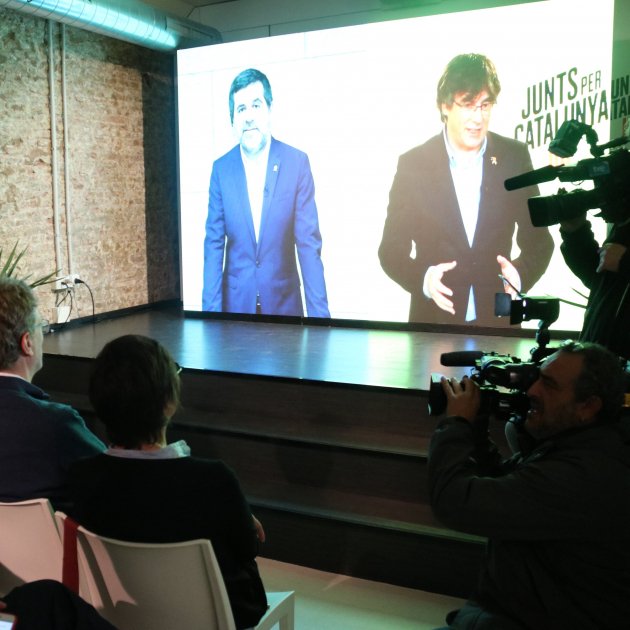The last time they met, one was president of Catalonia and the other president of the Catalan National Assembly. It had been 553 since Carles Puigdemont and Jordi Sànchez had seen each other face-to-face. This Monday they were finally able to do so, albeit virtually, separated as they are by more than 1,500km. They were dressed almost the same: shirt, suit jacket, no tie and a yellow ribbon on their lapels. Thanks to technology and the new decision from Spain's Central Electoral Commission to allow the imprisoned candidates to take part in campaign rallies by video link from the prison, they were able to talk in real time, one connecting from Soto del Real prison near Madrid, one from Brussels, through JxCat's headquarters in Barcelona. After half an hour, a door creaked. "Mr President, they're coming to look for me, reminding me I'm in prison and time's up," said Sànchez. Puigdemont tried to hold back his tears.
The conversation was emotional but, aware it was a campaign event, not a catch-up, both presidents made sure to include their political points. The main messages: "the spirit of the 1st October [2017 and the referendum] is what will take us out of here", "exile is a prison as hard as the one we're suffering" and "the solution won't arrive the day after tomorrow". Their recipe for this is "persistence, perseverance and patience".
There were nerves in the IT room at JxCat headquarters, partly for the meeting itself, but especially over where the technology would work. The complex web of connections did work smoothly, apart from the unavoidable issues in such instances: the delay, four seconds today, and the fact that they could see each other, but not the room full of people in Barcelona following their conversation, which included most of the senior figures from the party's election candidacy, headed by Sànchez himself.
Puigdemont's first act was to take the opportunity to congratulate Sànchez on his name day tomorrow (Sant Jordi's Day also being an important festival in Catalonia) and to ask him to pass on warm wishes to Jordi Cuixart, vice-president Junqueras and the other imprisoned ministers. For his part, Sànchez wanted to send Puigdemont his support after yesterday's images of a village in the south of Spain burning and shooting an effigy of him. According to a clearly moved Puigdemont, "yesterday they attacked everything that we represent, the yellow ribbon, the republic, independence". That said, he expressed hope that "it will have been worth it going through everything we're going through". Although he warned that "it won't be solved by magic", he called on those listening to "set down every day another paving stone on this path towards independence, which now has no way back".
Progress since 2017
During the conversation, Puigdemont and Sànchez defended the values they say characterise the Catalan cause: civility and pacifism. To show that patience and determination bear fruit, Sànchez gave two examples. The first was his time as a conscientious objector when Spain still had national service. That stance took many of his colleagues to prison but ended up bringing about the end of compulsory military service, "because there are people who stayed true".
The other example, he said, of why perseverance is worth it is the difference between this Spanish general election campaign and the Catalan election campaign in December 2017, shortly after the declaration of independence and his imprisonment. Then he was "punished with being locked in [his] cell for 30 days without being able to go out into the courtyard simply because I left a phone message talking to voters". That recording was played at JxCat election rallies. "Who would have said that 18 months later we'd be able to do this," he wondered: "it's because we've stayed strong".
The long-anticipated embrace
"For us to be able to embrace each other soon will depend in part on the 28th April; the spirit of the 1st October will take us out of here". As well as mutual thanks, Puigdemont and Sànchez expressed confidence that sooner or later they will meet again, and not by video link, but in the flesh. They warned though that "there's not a good and a bad 155", meaning the article of the Spanish Constitution which was used in 2017 by the central government to take direct control over Catalonia, "it's all 155, no ifs or buts". This was aimed particularly at those thinking of voting tactically for centre-left PSOE, one of the parties which supported the 2017 move, over fears of a three-party right-wing coalition government.
That wasn't the only hope Puigdemont expressed to Sànchez: "I want to see you getting up on the podium in the Congress with all your dignity to address all the deputies, looking them in the eyes, seeing who holds your gaze, sending a message of civility".
Rarely had thirty minutes given so much; rarely had they seemed so short.
